Are you ready to embark on a sonic journey that will uplift your spirits, soothe your soul, and unleash a wave of positive vibes? Well, get your headphones on and turn up the volume because we’re about to explore the incredible effects of music on your wellbeing!
Music has this incredible way of speaking to us on a level that words simply cannot. It has the power to transport us to another world, evoke deep emotions, and ignite a fire within us. Whether you’re a fan of pop, rock, classical, or something in between, there’s a genre for every mood and every moment.
Music, the universal language that transcends borders and cultures, holds an incredible power to impact our emotions and overall wellbeing. For students of musicology, exploring the effects of music on mood and harnessing its potential for personal wellbeing is not only a fascinating endeavor but also a valuable tool for self-care and growth. In this column, we will delve into the profound effects of music on our emotional state, examine the scientific research behind its influence, and explore practical ways to apply music for your wellbeing.
The Connection Between Music and Mood
Have you ever found yourself feeling elated and energized after listening to an upbeat pop song or finding solace in a soothing melody during times of stress? These experiences are not coincidental but rather a result of the complex relationship between music and mood. Music has the power to evoke a wide range of emotions, from joy and happiness to sadness and nostalgia, often triggering memories and associations that heighten our emotional response.
Scientific studies have demonstrated the impact of music on our brains and bodies. Listening to music releases dopamine, a neurotransmitter associated with pleasure and reward, creating a sense of euphoria and happiness. Additionally, music stimulates the release of endorphins, which can alleviate pain and promote relaxation. Research has also shown that slow, calming music can reduce stress hormone levels and lower blood pressure, while upbeat and lively tunes can boost energy and motivation.
So, let’s dive right in and explore how music can enhance your overall wellbeing and how you can make the most of its magic in your daily life.
- Mood Booster Extraordinaire: Feeling down in the dumps? Music is the ultimate mood booster! It has the ability to lift our spirits and infuse us with positive energy. Next time you find yourself in a funk, create a playlist of your favorite upbeat tunes and let the rhythm and melody work their magic. Dance like nobody’s watching, sing at the top of your lungs, and let the music wash away your worries.
- Stress Reliever: Ah, the soothing power of music. When the pressures of life start weighing you down, turn to music as your personal stress reliever. Slow, melodic tunes have been shown to reduce stress and anxiety, promoting a sense of calm and relaxation. Find a quiet corner, put on some instrumental music or gentle ballads, and let the worries melt away.
- Motivation and Productivity: Struggling to focus on that pile of assignments or the never-ending to-do list? Music can be your secret weapon to boost productivity. Upbeat and energetic tracks can ignite your motivation and help you power through tasks with renewed enthusiasm. Experiment with different genres and find the music that gets your creative juices flowing.
- Healing and Emotional Catharsis: Music has an uncanny ability to touch our hearts and heal our emotional wounds. When you’re going through a tough time, find solace in the lyrics and melodies that resonate with your emotions. Whether it’s a heartbreak, a loss, or simply a moment of introspection, music can provide a safe space for emotional catharsis. Allow yourself to feel, reflect, and heal through the power of music.
- Social Connection: Music has a way of bringing people together, creating connections, and fostering a sense of community. Join a choir, band, or music club where you can share your passion with like-minded individuals. Collaborating with others in creating and performing music not only enhances your skills but also enriches your social life and overall wellbeing.
- Mindfulness and Meditation: Have you ever tried incorporating music into your mindfulness or meditation practice? The combination of soothing sounds and deep breathing can transport you to a state of tranquility. Look for meditation music or nature sounds that resonate with you and use them as a backdrop to enhance your mindfulness practice. Let the music guide you to a place of inner peace and clarity.
- Self-Expression and Identity: Music can be a powerful tool for self-expression and personal identity. Especially as a student of musicology, you have the opportunity to explore different genres, instruments, and styles, allowing you to discover your unique musical voice. Use music as a means to express your thoughts, emotions, and experiences, and let it be a reflection of who you are.
- Daily Rituals and Routines: Integrate music into your daily routines to enhance their enjoyment and meaning. Create a playlist for your morning routine to start the day on a positive note, or unwind in the evening with calming tunes before bed. Music can infuse even the most mundane tasks with joy and turn them into moments of pleasure.
Remember, the beauty of music lies in its diversity. Don’t be afraid to step out of your comfort zone and explore new genres, artists, and musical cultures. Allow yourself to be surprised and inspired by the endless possibilities that music offers.
So, dear music enthusiasts, let the melodies be your medicine, the rhythms your therapy, and the lyrics your guiding light. Embrace the transformative power of music, and let it rock your way to wellbeing!

